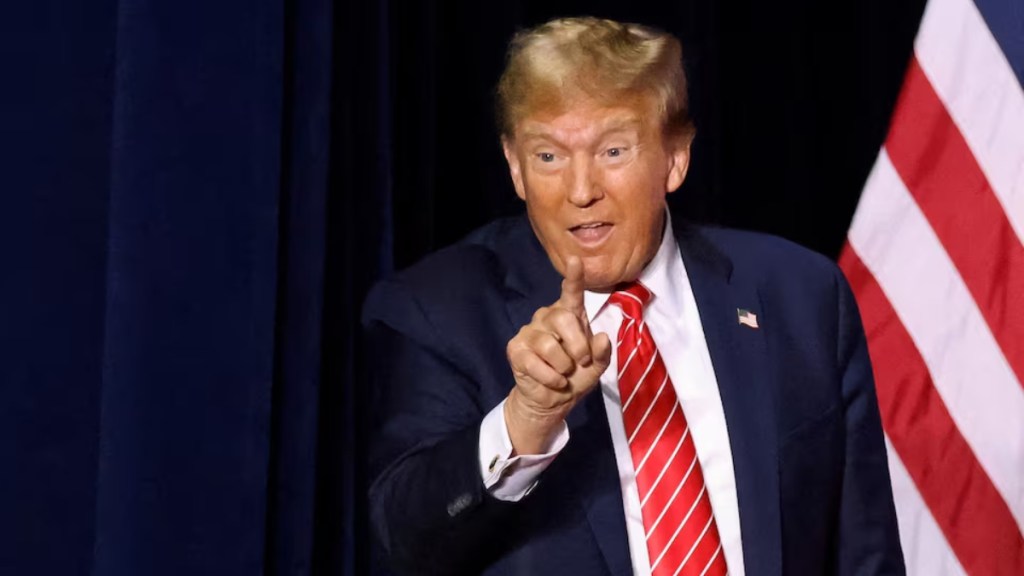Donald Trump escalated global trade tensions on Wednesday, threatening to impose additional tariffs on European Union (EU) goods. His remarks came as major US trading partners, including the EU and Canada, announced retaliatory measures against the trade barriers his administration has put in place.
Just hours after Trump’s 25% tariffs on US steel and aluminum imports took effect, he warned of further penalties if the EU proceeds with its planned counter-tariffs on American goods next month. “Whatever they charge us, we’re charging them,” Trump told reporters at the White House.
Market Jitters and Economic Fears
Trump’s aggressive tariff strategy has rattled investors, businesses, and consumers, raising concerns about a potential recession. His approach has also strained relations with Canada—a close ally and key trading partner—by repeatedly threatening to annex the country.
In response, Canada, the top foreign supplier of steel and aluminum to the US, announced 25% tariffs on those metals, along with computers, sports equipment, and other goods totaling $20 billion. Canada had already imposed similar tariffs on US products in retaliation for previous trade restrictions.
“We will not stand idly by while our iconic steel and aluminum industries are unfairly targeted,” said Canadian Finance Minister Dominic LeBlanc. To mitigate the economic fallout, Canada’s central bank also cut interest rates.
The new US tariffs not only reintroduce a 25% duty on all steel and aluminum imports but also extend the levies to downstream products such as nuts, bolts, bulldozer blades, and soda cans. Additionally, US Commerce Secretary Howard Lutnick confirmed that Trump is considering imposing trade restrictions on copper as well.
A Reuters/Ipsos poll revealed that 57% of Americans believe Trump’s trade policies are too erratic, while 70% expect the tariffs to increase consumer prices.
Europe Prepares to Hit Back
The 27-nation EU is less exposed to the tariffs, with only a small fraction of its exports targeted by the US, according to Germany’s Kiel Institute. However, the EU’s retaliatory measures will impact up to $28 billion worth of American goods, including dental floss, diamonds, bathrobes, and bourbon. While these products make up a small portion of the vast US-EU trade relationship, industries such as liquor producers warn the tariffs could be devastating.
European Commission President Ursula von der Leyen emphasized that the EU will continue negotiations with US officials. “It is not in our common interest to burden our economies with such tariffs,” she said.
At the White House, Trump doubled down on his stance, warning that he would “of course” respond with further tariffs if the EU follows through. Standing beside Irish Prime Minister Micheál Martin, Trump criticized Ireland—a key EU member—for attracting US pharmaceutical companies with tax incentives.
In contrast, Martin used a White House ceremony to highlight the history of free trade between the US and Ireland. “Let us continue to build on that foundation,” he said, as Trump looked on without reacting.
Global Reactions and Economic Fallout
China’s foreign ministry responded by stating that Beijing would protect its interests, while Japan’s Chief Cabinet Secretary Yoshimasa Hayashi warned that the move could have major implications for US-Japan trade relations.
Close US allies Britain and Australia criticized Trump’s sweeping tariffs but ruled out immediate retaliatory measures. Brazil, the second-largest steel supplier to the US, also indicated it would not take immediate action.
Despite the heightened trade tensions, global stocks remained stable, as markets had anticipated the tariff hikes. However, the prolonged dispute has left companies on edge. Luxury carmakers and chemical producers have expressed concerns over the impact on consumer demand and industrial growth.
More than 900 of the 1,500 largest US companies have cited tariffs as a business risk in earnings calls and investor presentations this year, according to LSEG data. “We are in a trade war, and when a trade war starts, it tends to sustain and feed itself,” warned Airbus CEO Guillaume Faury on French television.
Shares in German sportswear giant Puma plummeted nearly 25% after its latest earnings report underscored concerns that trade tensions are dampening American consumer spending. Meanwhile, US steel producers welcomed Trump’s move, arguing that previous tariffs from 2018 had been weakened by numerous exemptions.
JPMorgan’s chief economist predicted a 40% chance of a US recession this year, citing the potential long-term damage to the country’s reputation as a reliable investment destination. A steep selloff in US stocks in March erased all the gains Wall Street had made following Trump’s election.
Trade War Strains US-Canada Relations
As US-Canada trade tensions escalate, Canadian Prime Minister Justin Trudeau is preparing to transition power to his successor, Mark Carney.
“I’m ready to sit down with President Trump at the appropriate time, in a manner that respects Canadian sovereignty and seeks a common approach,” Carney stated while visiting a steel plant in Ontario. Other Canadian officials are scheduled to meet with US representatives in Washington on Thursday.
Anti-US sentiment in Canada has grown, with American products being removed from some store shelves, and the US national anthem booed at hockey games. Meanwhile, travel to the United States has declined, with bookings dropping 20% compared to last year.
(With inputs from agencies)

